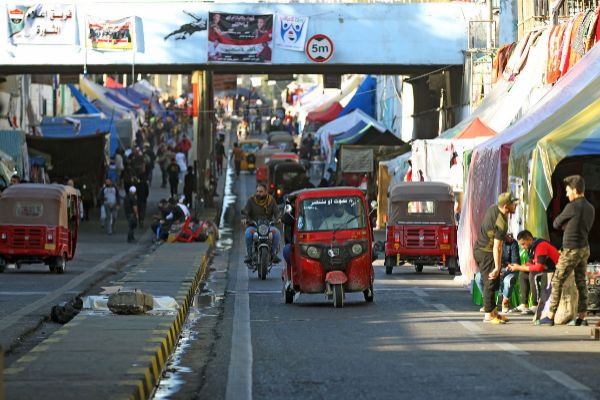- Direct witness: a redoubt of freedom in the middle of Baghdad
- Demonstrations: Violence escalates in Iraq with lynching of a teenager in the midst of protests against the government
Iraq was preparing this midnight to plunge into constitutional confusion after its president, Barham Saleh, could not nominate a candidate to replace Prime Minister Adel Abdel Mahdi, in the deadline established by the Magna Carta.
The acting head of government resigned last day 4 after the death of dozens of protesters at the end of November in a new and tragic rebound in violence that is characterizing the repression of the protests facing the Arab nation.
Saleh and the legislators are engaged in a nth controversy around dialectical and procedural issues that ignore the extent of a crisis that threatens to cause the country's paralysis.
A group of parliamentarians accused the head of state of wanting to also appropriate the position of chief executive, a prerogative that contemplates the local constitution in case of vacancy of this position. "According to the information we have, Saleh is trying to ignore the constitutional limits (the magna Carta contemplates a period of 15 days to appoint a possible substitute after the resignation of the prime minister), "deputy Abdel Amir Taiban told a local newspaper.
From northern Iraq, the main Kurdish leader, Masoud Barzani, expressed his "concern" on Tuesday about what he called a possible "constitutional vacuum" in the country. On Wednesday the parliament was unable to pass a new electoral law - another demand of the protesters - is another example of the disunity and factionalism that has undermined the work of that institution since the 2003 invasion , which caused an almost absolute collapse of state institutions and degenerated into a bloody civil war.
"There are differences of all kinds and it will not be easy to reach an agreement on the new electoral law soon," lawmaker Hassan Khalati assumed in statements to Reuters. "So far the political parties have not agreed on any candidate. We have multiple applicants, but being affiliated with parties that prevents them from accessing the post, " said Naeem al-Abboudi.
According to analysts like Yassin al-Bakri, professor of political science at Nahrain University in Baghdad, article 81 of the Iraqi constitution gives the head of state the power to assume the powers of the prime minister if that position is empty, although at the end of the Last month he preferred to keep the outgoing chief executive on duty.
"Most likely, the president will wait for the nomination of the parties. It is a process that usually takes months," Al Monitor told the publication. The options of applicants such as former Human Rights Minister Mohammed Shia al-Sudani, hitherto a member of the Dawa Party, or the former Minister of Higher Education, Qusai al-Suhail, have been rejected by opponents who have hung a banner on the Tahrir Square where they specify the conditions that the next candidate should have: being under 54, not belonging to any political party and not having held any position of minister or high responsibility in the Iraqi administration after the 2003 invasion.
On the contrary, young people have crossed out the photos of characters like Sudani or Suhail, making clear their rejection of these politicians.
A camping sector released a statement on Thursday that proposed Saleh to appoint an interim prime minister for a period of 6 months in which he would organize new elections.
" What we want is a technocrat who is not corrupt and does not depend on foreign countries," said Omar Subhi, one of the activists camped in the center of the Iraqi capital.
The cleric Muktada al Sadr, a reference in the main political bloc of the assembly - where he has 54 legislators - also rejected Sudani's option and said that it should be the protesters who proposed a candidate. According to some local media, a block of up to 170 legislators supports that same hypothesis and also require that the applicant only have Iraqi nationality in reference to the members of the elite that governs the country that have double passports, which have earned a sad reputation in recent years.
Opponents maintain various blockages throughout the country that affect not only the center of cities. They have also expanded their actions at the closing of Universities and have tried to interrupt the transit to such strategic facilities as the Basra oil wells.
According to the criteria of The Trust Project
Know more- Iraq
Middle East The Iraqi Parliament accepts the resignation of the Prime Minister and opens a period of uncertainty
International Israel will hold the third elections in less than a year due to the absence of a candidate
Finland Sanna Marin, the youngest prime minister in Finland's history

